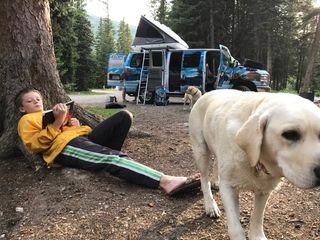Motivation
17 Tips for a Mindful Family Vacation
How to fill a family trip with curiosity, observation and wonder.
Posted July 1, 2017

This morning, I stumbled out of our rented Escape Campervan to find ice on the picnic table at Chisholm Campground in Hyalite Canyon, Montana. Our nine-month-old puggle, Bilbo, had gotten restless with the rise of the solstice sun, 5:28am up at the 45th parallel, and had taken it upon himself to begin the day for us all. Trying to keep the kids asleep in the rooftop tent, I stuck sockless feet in cold running shoes and grumbled off into the woods with the dog, shivering and slightly hung over (me, not the dog).
When imagining this glamping trip from Denver through the Rockies to Lake Louise, we pictured the rock climbing destinations we would explore with our kids, now 9 and 11, finally competent and resilient enough to join the adults. We pictured evenings spent reading books by rivers and lunches of French bread, cheese and sausage. But we failed to account for the reign of Bilbo, who learned within minutes of our first night to shuck his full-body harness and run through the wilderness hunting small things that scamper while howling his joy like the unholy love child of a chimpanzee and a hyena.

The fierce little b*stard learns how to belay.
My first goal, I decided, was to surprise something furry and toothsome in the Montana woods that would “play” with Bilbo. And then I would go back to the campsite where I could make strong coffee on the Coleman stove and hold the warm metal of the percolator against my abdomen. I hiked toward the canyon’s southern shoulder seeking the sunlight that had started to creep down from the ridgeline.
Breathing hard, Bilbo and I hiked past early-season wildflowers – lupine, avalanche lily and paintbrush – opening in meadows that had recently been snowfields. We hiked past a rock amphitheater where people climbed frozen waterfalls in the winter. We were alone but for the sound of a meltwater creek and the intermittent chirrups of pissed-off squirrels.
Suddenly the early morning was not a chore but an opportunity. I didn’t have to be there, and instead it was a privilege that I got to be there. The sun hit us in the face. When Bilbo and I finally got back to the campsite, the coffee pot was spitting and the kids had squared off with quarterstaves on a log above a cold river. Perfect.
This wasn’t our first time glamping with kids and dogs, and over java and eggs, my wife (a PhD psychologist) and I started to reflect on the lessons we’ve learned – mostly the hard way – about making a vacation about more than ticking the boxes of travel. My other gig is writing books about science, math, the brain, and social experiments. Combining experience with researcher interviews, here is our woefully incomplete but hopefully helpful list of ways to expand the richness of your vacation:
1. Set your purpose. Talk to your partner or other adults in the group about the purpose of the vacation. Is it to learn a language, or explore history, or connect as a family? Then check in often to see if your activities are helping you reach your goals.
2. Don’t make yourself responsible for everyone’s happiness. The perfect vacation may have many imperfect moments. You may design activities with your group in mind, but finding enjoyment in these activities is up to each person.
3. Talk to locals. In addition to getting the inside scoop on the best breakfast joints and which park has free music on Thursday evenings, try to discover what it’s like to live a life that is different than your own. Travel affords the opportunity to experience different viewpoints that you can't see from the roadside photo opportunities.
4. Be aware of comfort zones. We all have our likes and dislikes, goals and challenges. While it's worth pushing the limits individual comfort zones, don’t be afraid to divide and conquer – maybe mom takes one kid on the zipline while dad takes the other on a hike around the lake. There's no need to force one person's fun on the group.
5. Set expectations for unplugging. It may not be realistic or even desirable to completely unplug, but setting the rules for digital entertainment (and for your own work…) will decrease friction later on.
6. If road-tripping, use audiobooks rather than movies so that everyone is forced to look out the windows.
7. Admit your mistakes. When what you thought was going to be a spectacular castle turns out to be rocks in a bog, don’t be afraid to admit your disappointment. Same thing when you take a wrong turn that costs an hour. It's inevitable that you will all struggle at some point on vacation. By admitting your own mistakes, you can make it okay for others to experiment.
8. Allow downtime. There’s always something more to see or do, but vacation doesn’t always have to be go, go, go. Playing cards or reading a book can be equally valid ways to wring every last drop of vacation from the day.
9. Document your memories but don’t let it turn into a Facebook competition. Ask yourself why you post things online – is it so that you will have these memories or to display your vacation for others? If for others, consider keeping these memories in other ways, maybe by scrapbooking or by sending postcards to yourself along the way.
10. Make it about people. Rather than thinking of your vacation as a list of places, remember the people you met or visited. Could you tell the story of your vacation as a list of connections?
11. Under-schedule. Flexibility allows you to stumble into impromptu opportunities that are impossible if you have strict dinner reservations.
12. Set daily expectations. If you have a long drive, make sure everyone expects it to be moderately awful. If you will be waking up early for an activity, making sure everyone is on board the night before can decrease the whinging when the alarm sounds.
13. Allow independence. When you can, empower kids (and other adults…) to shape their own experiences. This may look like sending kids for cheese at a farmer’s market or giving money for souvenirs as a lump-sum at the start of the trip.
14. Be realistic. Vacations can spur growth as people step up to meet new demands. But if the demands are unrealistically high, vacation can become a series of failures. Can your family really hike 12 miles? Can your young kids really stay up past midnight? If yes, then by all means go for it! But if success has the odds of a Powerball jackpot, it's probably best to revise the plan.
15. Learn all you can. Information creates engagement and a rich experience. Whether it’s learning about the geography, geology and ecology of the landscapes you visit or an area's human history, the more you know, the more you will enjoy the experience.
16. Be curious and observant. Allow yourself to wonder!
17. Allow time for reflection. Check in periodically about the top things you’ve done so far, the three hardest things, things you would want to do again, etc.
Of course, we all have our favorite travel tips. But when you put them all together, many of them circle around the idea of not only doing things together, but truly being together -- authentically and mindfully. Turn on your engagement. Open yourself to the experience. And find the connection hidden in the moments of your vacation.




